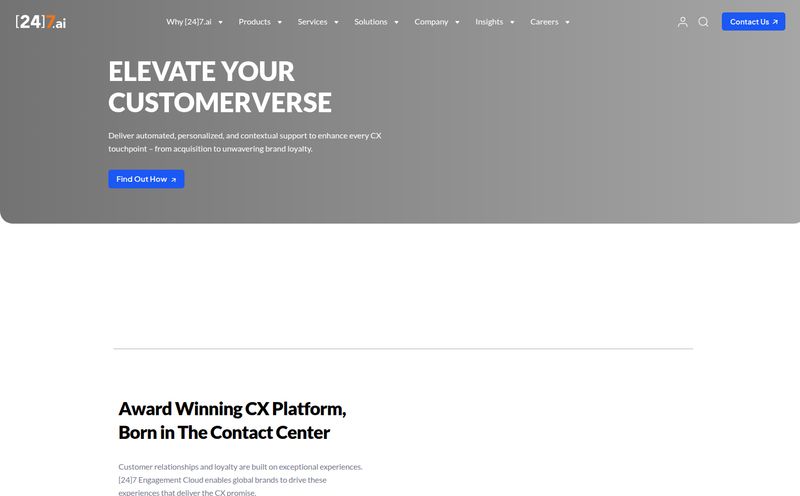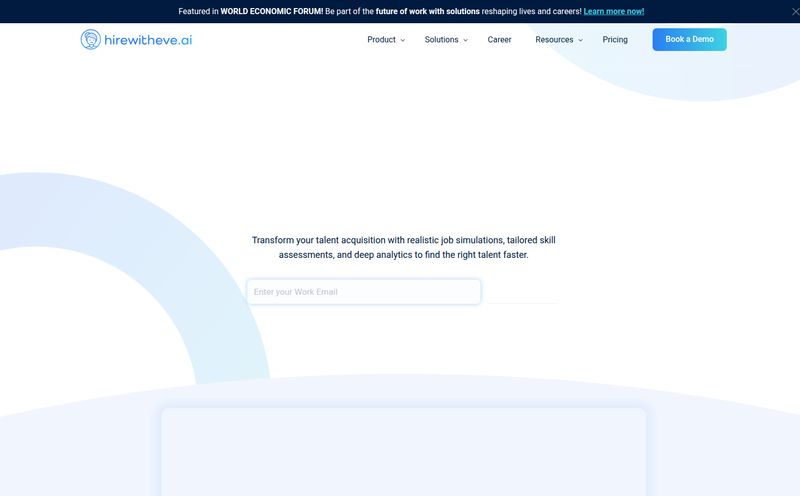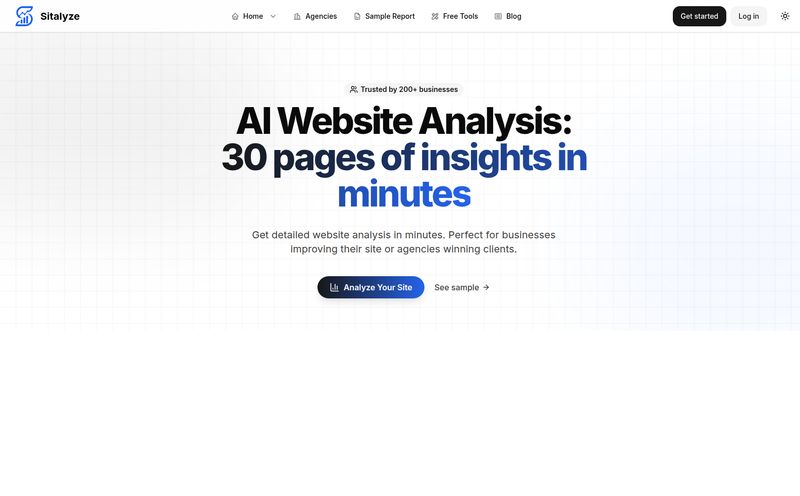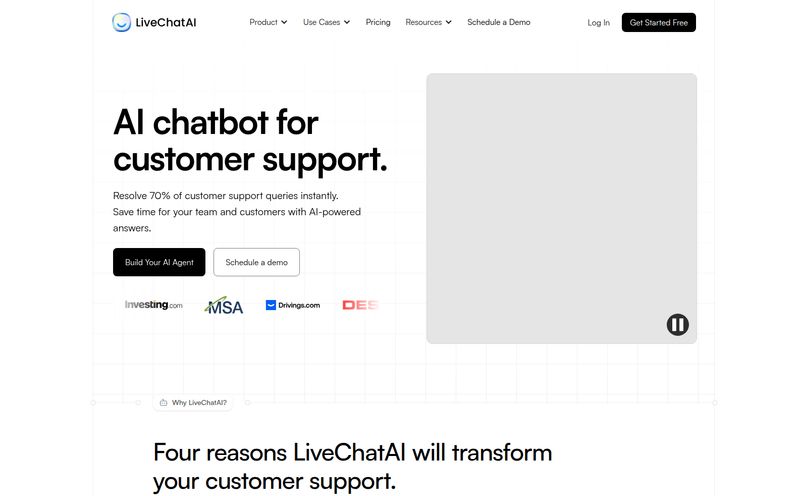Ever had that feeling? You’re five minutes away from a QBR with a major client. You've got your CRM open on one tab, Zendesk on another, and you’re frantically trying to remember if this was the client whose team complained about that one feature last month. You’re flying blind, armed with scattered notes and a hopeful smile. It's a classic Customer Success Manager (CSM) nightmare. We’ve all been there.
For years, we've talked about being 'data-driven,' but in reality, our data lives in a dozen different walled gardens. Product has the usage stats, support has the pain points, and we, the CSMs, have the call notes. It's a disconnected mess. This is the exact problem a tool I've been looking at, Userlens, is trying to solve. It’s a product intelligence platform from the folks at Wudpecker, and its premise is deceptively simple: what if you could see what users do right alongside what they say?
So, What's the Big Deal with Userlens?
Okay, let's cut through the marketing jargon. Userlens isn't just another analytics dashboard. I've seen a million of those. It’s a platform designed to bring two critical, but often separate, worlds together: product analytics and customer feedback. Think of it like this: traditional analytics tells you that a user stopped using a feature. Userlens aims to help you understand why by pulling in their support tickets, call transcripts, and survey responses. It’s the difference between knowing someone left the party and knowing they left because they hated the music.
For B2B SaaS companies, this is a game-changer. We're not just dealing with anonymous users; we're managing high-value accounts. Understanding the health, happiness, and frustrations of an entire team at a client company is the holy grail. Userlens pitches itself as the tool to finally give us that unified view.
Giving CSMs the Superpowers They Deserve
The platform's whole vibe seems to be about empowering the CSM. The website literally says, "Don't leave your CSM in the dark before a customer meeting." Hallelujah. Here’s how it seems to pull that off.
Finally, Analytics and Feedback in One Place
This is the core promise. Imagine prepping for that client call and seeing a single dashboard that shows you:
- Product Usage: Which features are they using? Who are the power users? Who hasn't logged in for three weeks?
- Feature Adoption: How is their team adopting that new module you launched? Is it taking off, or is it a ghost town?
- Direct Feedback: What did their CEO say on the last sales call? What's the sentiment in their last five support tickets? Did they trash you in an open-ended survey question?
Having this side-by-side means you can connect the dots. "Ah, their usage of the reporting feature dropped right after John submitted that ticket about it being too slow." That’s not just data; that's actionable intelligence.
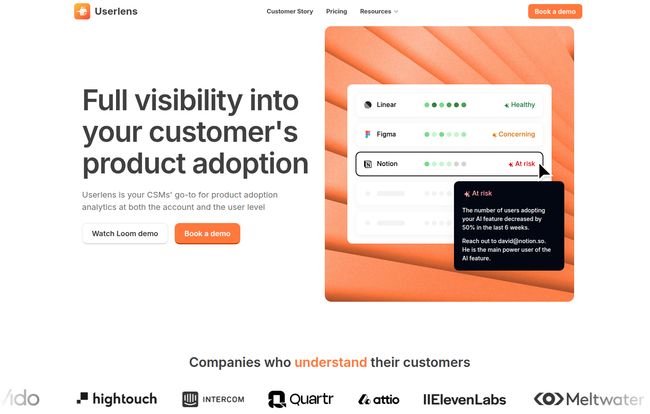
Visit Userlens by Wudpecker
Dashboards That Don't Require a PhD
I’ve spent more weekends than I care to admit trying to build custom reports in clunky BI tools. It's a soul-crushing experience. Userlens seems to get this, offering ready-made dashboards built with standard B2B SaaS metrics and cohorts. This means you can, in theory, get value much faster without needing a dedicated data analyst to hold your hand. For busy teams, this is huge. You can get straight to analyzing customer health and adoption without a massive setup project.
Getting Ahead of the Goodbye
The biggest win? Moving from reactive to proactive. Instead of getting that dreaded "we're not renewing" email out of the blue, Userlens is built to help you spot the red flags early. This is what they mean by churn risk detection. A sudden dip in usage, a key champion going inactive, a spike in negative-sentiment support tickets... these are all warning signs. The platform consolidates these signals so you can intervene before it's too late. This is the promise of so many tools, but by combining both behavioral and voiced data, Userlens has a much better shot at actually delivering on it.
Let's Be Real: The Potential Hiccups
No tool is perfect, and from my analysis, there are a couple of things to keep in mind. First, Userlens isn't magic. It requires you to connect your existing data sources. Your analytics, your support desk, your CRM... they all need to be piped in. This will take some initial setup time and technical buy-in. It’s a necessary evil—the platform can’t show you data it doesn’t have—but it's a hurdle to be aware of. It's not a plug-and-play solution in five minutes.
The other thing is the pricing. Like many B2B SaaS companies targeting more than just small businesses, the pricing information isn't plastered on the website. You wont find a neat little table with three tiers. This usually means a "Contact us for a demo" situation, with pricing based on your company's size, data volume, or specific needs. It's not a red flag, just the standard playbook for this kind of platform. Just don't expect a simple monthly subscription fee you can swipe a credit card for.
Who Is This Really Built For?
Let's be clear: Userlens is not for everyone. If you're a solopreneur with a simple B2C app, this is probably overkill. But if you're a B2B SaaS company with a dedicated Customer Success team, this should be on your radar. I'd say it's ideal for mid-market and enterprise companies where the cost of losing a single client can be devastating. Product Managers and even marketing teams could also get a ton of value from these unified insights, helping them build better roadmaps and create more relevant campaigns.
Essentially, if you feel like your customer data is scattered and your CSMs are constantly playing defense, Userlens is designed to be your new offensive coordinator. It’s about arming your team with the right intelligence to build better relationships and, ultimately, protect your revenue.
The world of customer success is getting more complex. Gut feelings and friendly check-ins aren’t enough anymore. We need data, but not just charts and graphs—we need the story behind teh data. A tool that combines the 'what' with the 'why' feels less like a nice-to-have and more like the future of the profession. Userlens is making a strong play to be a central part of that future.
Frequently Asked Questions about Userlens
What is Userlens in simple terms?
Userlens is a product intelligence platform for B2B SaaS companies. It combines product usage analytics (what users do) with customer feedback from calls, tickets, and surveys (what users say) to give you a complete picture of your customer's health.
How does Userlens help reduce customer churn?
It helps by identifying early warning signs of churn. By tracking dips in product usage, feature adoption, and analyzing the sentiment of customer feedback, it allows Customer Success Managers (CSMs) to proactively address issues before a client decides to leave.
Is Userlens GDPR compliant?
Yes, the information available indicates that Userlens is GDPR compliant and stores its data securely on EU servers, which is a critical factor for businesses handling European customer data.
What kind of B2B SaaS teams would benefit most from Userlens?
Primarily, Customer Success teams benefit by getting a unified view to prepare for client meetings and manage accounts proactively. However, Product teams can use the insights to build better products, and Marketing teams can understand user pain points for more effective messaging.
How much does Userlens cost?
Pricing for Userlens is not publicly listed on their website. This typically means they offer customized pricing based on your company's needs. You would likely need to contact their sales team for a demo and a personalized quote.
References and Sources
- Userlens Official Website
- Wudpecker Official Website
- Forbes - Smart Ways Tech Companies Can Reduce Customer Churn
